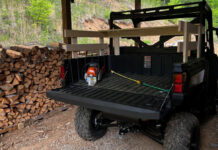I signed a contract for our new solar system. With any luck, it will be installed by Independence Day.
The timing couldn’t be more right. We had another power outage this weekend because of bad weather.
Because of the high cost, the decision to commit to solar was not a decision we made lightly. After the federal tax rebate (30 percent) and a smaller rebate from the utility, we are still more than $20,000 out of pocket. Of course, this is only about half again as much as the whole-house propane powered generator we looked at installing. And while we could run out of propane in a long-term SHTF scenario, we are unlikely to run out of sunshine unless there’s a terrible nuclear winter.
That $20,000 will be offset over time by the money we save on our electric bill, which we estimate to be around $1,500 to $1,800 per year. That’s now. As prices rise, our savings will grow.
We save money on electricity in two ways: First, because we produce our own, we don’t have to buy it from the utility. Second, we sell excess electricity to the utility. This helps offset any electricity we would buy on cloudy days or at night.
Smart Switches
If the grid goes down, the system will back up our entire house, although some smart switches will turn off the HVAC and the hot water heater when the battery drops below a pre-set percentage. So if we are in a multi-day outage, it would be all systems go while the sun is shining. After the sun sets and the battery starts to discharge, the system shuts down the high-draw electrical appliances so we do not run out of battery power. It’s all programmable and we can select the levels.
No HVAC is not a big issue. Chances are, we’ll only need the air conditioning when the sun is shining. In the winter, we heat with wood. A hot water tank that only produces hot water when the sun is shining is something we’ll have to get used to, just like we’ll have to get used to not running the dryer or the oven when we are on battery power. As far as adjustments go, those are minor compared to having no power at all.
In a snowstorm or other lengthy grid outage, we can hook up the generator and use it to recharge the batteries. My current generator provides only about half the power that the panels do, but it would fully charge the system in less than eight hours. I will track how often we need the generator and will consider getting a more powerful one if we use it often. If course, gasoline is a consumable, if I’d rather save it for the chain saw and rely on sunlight for power.
Grid Problems
I have been a prepper for about 30 years, and I’ve never owned more than 250 watts of solar panels. Now I’m getting 10,000 watts. One reason for this big change is my fear that changes to the country’s electrical generating and distribution system, plus laws mandating electric vehicles, will result in a less reliable electrical grid. I want the capability to produce and store electricity so we can have power continuity when the inevitable grid problems arise.
I foresee a shortage of electricity by 2027 if no one stops the EPA and other Biden Administration policies governing green energy and electric vehicles. Not only won’t we be able to produce sufficient electricity to meet the country’s needs, we won’t have the infrastructure to distribute sufficient electricity to meet demand. Just supporting AI will take incredible amounts of power, power that is not currently available.
Unless there is a sudden technology breakthrough and we can produce cars and trucks powered by clean-burning hydrogen instead of electricity, the Biden plan to convert diesels trucks and gasoline-powered cars to electricity cannot be achieved without doing great harm to the country. We’d need to place miniature nuclear reactors in cities and towns just to generate enough power to charge that many vehicles, and that technology isn’t ready.
While I expect my solar system will be very useful in a SHTF scenario in which we lose all our utilities for months or years, I think it is more likely we’ll use it to compensate for grid problems caused by regulation. This, more than anything, is what convinced me to spend the money.
Potential Problems
I don’t expect my solar power package to be without problems. For example, while it has some protection, it could be vulnerable to EMP or a CME. Of course, electronics break and wear out. This is not a third-world system. I can correct minor problems like a loose wire, but if a major component fails, we’ll be out of luck if there isn’t a supply chain to bring us replacement parts.
It is also under-powered. If I had an extra $60,000 or $70,000, I’d increase the number of panels and add three times the battery power. That’s what it would take to get through a multi-day outage or to live through a long-term grid down scenario with no need to monitor our consumption. What we are installing is a compromise. The system will carry us from sunset to sunrise no problem, but if the next day dawns and the sun is hidden by rain or snow, the batteries won’t carry us through the next 24 hours unless we scale back our electrical consumption.
It’s all a Tradeoff
In a survival scenario without the rule of law (WROL), our solar system will make us a target. We’ll be able to run a load of laundry, take a hot shower, and bake bread in an oven when our neighbors are cleaning their clothes in the creek, taking a sponge bath, and wrapping dough around a stick to bake over an open fire. That is going to create envy and resentment among our neighbors and may be a magnet for trouble.
We’ll be able to share some resources by recharging our neighbors’ batteries and sharing some power, but it is going to make our defensive capabilities and personnel levels critical. The only good news is that we are well off the beaten track, so people won’t drive by and seeing our system. Like much of our prepping, we’ll want to keep the solar system on the down-low as much as possible.
Like anything, it’s a tradeoff. I’m hoping this one works out in our favor.







